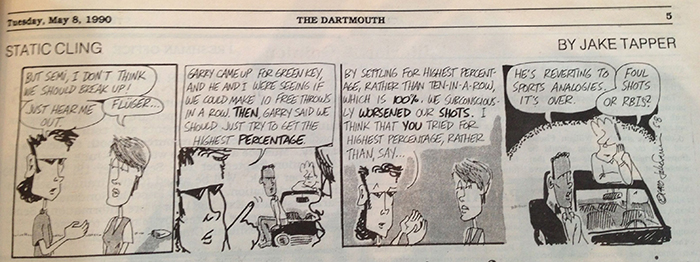
Recently appointed the anchor and chief Washington correspondent for CNN, Jake Tapper ’91 is about as connected, relevant, and respected as a journalist can be. He’s served alongside press corps veterans in Washington, D.C. for 14 years; his critically acclaimed book The Outpost: An Untold Story of American Valor was published in November 2012; he has more than 250,000 Twitter followers; and he’s appeared on shows including “The Colbert Report” and “Charlie Rose.” His new hour-long television show, “The Lead,” debuts on CNN this spring.
Tapper lives in Washington, D.C. with his wife, Jennifer Brown, son and daughter (both under the age of six), a dog and two cats. Tapper visits Dartmouth on February 19 to talk with students at a free event sponsored by the John Sloan Dickey for International Understanding. We spoke to him on February 13.
Q At Dartmouth you majored in history and visual studies and wrote the comic strip “Static Cling” for The Dartmouth. Did those experiences help prepare you for your life today?
At Dartmouth, there were always debates going on, whether it was regarding the fraternities, or gender issues, and it was always interesting to be part of that. Being a cartoonist I was able to report and satirize a lot of these debates.
More academically, when I started at Dartmouth I was trying to decide whether I would be a government major or a history major. History ultimately proved more compelling to me because it was not theory; it was what happened, what human beings did, and what transpired.
I think that ultimately, both of those things were invaluable, both the regular duty of commenting and reporting on and assessing campus life and then also taking the broader view academically as a student about historical events.

Q Your sourcing for the book The Outpost was significant. Did you learn that at Dartmouth?
Yes. I wrote so many papers for Professor Wright [Dartmouth president emeritus James Wright], David Lagomarsino [the Charles Hansen Professor of History], or Mary Kelly [former professor of history]. As a history geek you learn to take pride in footnotes and endnotes.
Q What’s been your approach to the new media landscape?
When I was a kid, Dan [Rather], Peter [Jennings], and Tom [Brokaw] were the anchors, and that was about it. And now there are hundreds of channels and people aren’t getting news solely from their TV anymore, much less newspapers. They’re getting it from their computer, from their phone. We have to go to where the viewers and the readers are. Ultimately if we just sit around and wait for them to come to us we’re not going to reach as many as we need to.
Q Do you enjoy Twitter?
I do. I learn a lot. I follow a lot of people whose views I might not necessarily be privy to, whether it’s a woman in Yemen or people on the fringes of society. Not to mention just keeping up with what people are thinking about political events on an hour-by-hour or minute-by-minute basis. And it’s a good way to reach people too. Though it does take you down a rabbit hole sometimes.
Q What’s the idea behind your new CNN show?
To look at six or seven leading stories of the day and try to take a different approach on them. Newspapers have a sports section and an arts section and a business section, so why wouldn’t a news show? The recent news that the wrestling won’t be a sport in the Olympics—that would have been a good piece for our show.
Q Do you get a chance to draw?
Only with my kids. We tried it at ABC, but with the role I’m in, it’s not as easy. Part of being a cartoonist is satire, and satire cannot be restrained. To be a newsman or newswoman you have to be restrained.
Q Do you have any friendly Ivy League rivalries with people in Washington, D.C.?
I definitely insult a lot of friends of mine who went to Harvard.
More on The Outpost:
A New York Times bestseller, The Outpost tells the story of a deadly battle between 53 U.S. troops—stationed at the bottom of three steep mountains—and more than 300 Taliban fighters. Tapper spent almost two years investigating the events and interviewed more than 225 individuals.
Time magazine’s Nate Rawlins wrote of the book: “Rather than tell the story of a general, or a battle, or a unit in combat, Tapper has instead written the biography of a place: Combat Outpost (COP) Keating. The result is perhaps the best book yet about the middle years of the Afghanistan War.”
Medal of Honor for Clint Romesha
On February 11, U.S. Staff Sergeant Clint Romesha, a soldier featured in Tapper’s book, received the Medal of Honor from President Barack Obama. Read Tapper’s story about Romesha, which begins, “It's not often that someone you know and consider a friend is awarded the Medal of Honor.”
